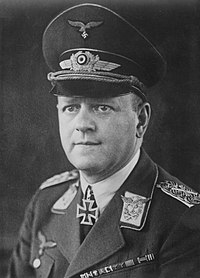Erhard Milch

Erhard Milch (March 30, 1892 – January 25, 1972) was a German officer who oversaw the development of the Luftwaffe as part of the re-armament of Germany following World War I.
Milch was born in Wilhelmshaven to German Jewish parents. During World War I he served in the German army, originally as an artillery officer. He later transferred to the air corps and trained as an aerial observer. By the end of the war, he had risen to command of a squadron. He remained in the military until 1920 when he took his aviation experience to the private sector.
Milch’s career before the rise of the Third Reich reflects the turbulent state of the emerging airline industry. With squadron mate Gotthard Sachsenberg, he formed a small airline in Danzig under the banner of Lloyd Luftdienst, Norddeutscher Lloyd’s union of regional German airlines. The airline, which linked Danzig to the Baltic States was simply called Lloyd Ostflug. In 1923, he became managing director of its successor company, Danziger Luftpost when Lloyd Luftdienst merged with its rival firm Aero Union to form Deutscher Aero Lloyd. From there, Milch and Sachsenberg went to work for rival Junkers Luftverkehr, where Sachsenberg had been appointed managing director. Sachsenberg only held the position until 1925, when Milch took over from him. It was in this position that Milch oversaw the merger of Junkers Luftverkehr to his previous firm of Deutscher Aero Lloyd in 1926, making him the first managing director of Deutsche Luft Hansa.
In 1933, Milch took up a position as State Secretary of the newly-formed Reichsluftfahrtministerium ("Reich's Aviation Ministry" - RLM), answering directly to Hermann Göring. In this capacity, he was instrumental in establishing the Luftwaffe, originally responsible for armament production although Ernst Udet was soon making most of the decisions concerning contracts for military aircraft. He quickly used his position to settle personal scores with other aviation industry personalities, including Hugo Junkers and Willy Messerschmitt. The personal score against Messerschmitt is one of the likely reasons that Willy Messerschmitt was not allowed to personally acquire the Bayerische Flugzeugwerke [BFW] until July 1938, resulting in the continued use of the Bf prefix for Messerschmitt aircraft designed before Messerschmitt's acquisition of the company, hence the "Bf-" prefix being the only one used for the Messerschmitt Bf 109, as one example, in all official German documents dealing with all pre-July 1938 origin Messerschmitt aircraft designs.
In 1935, Milch's ethnicity came into question when rumours began to circulate that his father, Anton Milch, was a Jew. This prompted an investigation by the Gestapo that Göring quelled by producing an affidavit signed by Milch's mother stating that Anton was not really the father of Erhard and his siblings, and naming their true father as Karl Brauer, her uncle. These events and his being issued a German Blood Certificate prompted Hermann Göring to give his famous "I decide who is and who is not a Jew" quote.
At the outbreak of World War II Milch, now with the rank of general, commanded a Luftwaffe wing during the Norwegian campaign. Following the defeat of France, Milch was promoted to field-marshal (generalfeldmarschall) and given the title Air Inspector General. Milch was put in charge of the production of planes during this time, and his many mistakes were key to the loss of German air superiority as the war progressed. Due to changing the designs and aircraft requirements frequently, manufacturers like Messerschmitt were unable to focus on aircraft output. Germany produced less than 5,000 planes during 1942, whereas Russia increased its aircraft production to over 40,000, leading to a change of superiority on the Eastern Front. Interestingly, during 1944, when Allied bombers were razing German factories and cities, aircraft production moved up to over 40,000, comparable with the Soviets, but too late. In 1944 Milch sided with Joseph Goebbels and Heinrich Himmler in attempting to convince Hitler to remove Göring from command of the Luftwaffe following the failed invasion of the Soviet Union. When Hitler refused, Göring retaliated by forcing Milch out of his position. For the rest of the war, he worked under Albert Speer.
Following Hitler’s suicide, Milch attempted to flee Germany, but was captured by Allied forces on the Baltic coast on May 4 1945 and subsequently tried as a war criminal at Nuremberg. He was found guilty and sentenced to life imprisonment at Landsberg prison, although he was released in June 1954. He lived out the remainder of his life at Düsseldorf, where he died in 1972.
A biography, highly sympathetic to Milch, The Rise and Fall of the Luftwaffe: The Life of Field Marshal Erhard Milch was published by David Irving in 1973.
